This month, we bring you news that –
- In Argentina, the Mapuche indigenous people continue to fight for their land rights in the face of the denial of those rights by provincial governments
- Amnesty International has published its Annual Report on Brazil, highlighting the role of racism in state violence, the killing of human rights defenders and journalists, and the occurrence of politically motivated violence in the run up to the elections last year
- Regarding Chile, Amnesty International has published a new Urgent Action demanding a halt to a proposed bill criminalizing refugees and migrants
- In Colombia, Amnesty International has published a new Urgent Action calling on President Petro to protect the human rights organization CREDHOS, after an explosive device was found at the entrance to their offices
- For Ecuador, Amnesty International has published an Urgent Action calling for the protection of Pablo Fajardo Mendoza, a lawyer accused by the government of being an “international criminal” for defending the rights of indigenous peoples
- Human Rights Watch have published their report regarding the oppression of protests in Peru late last year
- Amnesty International has published a new Urgent Action for Emirlendris Benitez, who has suffered torture and mistreatment in Venezuela – the Urgent Action joins those already published for the falsely imprisoned Javier Tarazona and for the repressive NGO bill
- Amnesty International has reminded the Peruvian and Chilean governments to protect the human rights of around 300 people stranded at the Peruvian and Chilean border
ARGENTINA
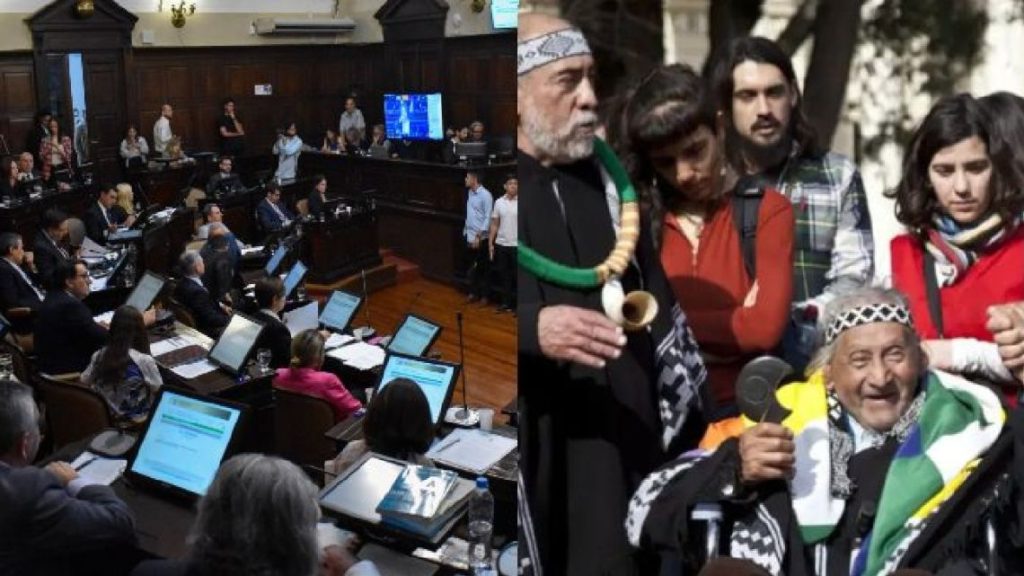
THE CHAMBER OF DEPUTIES IN MENDOZA VOTED A RESOLUTION WHICH MAINTAINS THAT “THE MAPUCHES SHOULD NOT BE CONSIDERED ORIGINAL ARGENTINE PEOPLES.” | CEDOC-PERFIL
Tens of thousands of Mapuches, members of an indigenous people established on both sides of the Andes in the Chilean and Argentine territory, are claiming the return of their ancestral lands and assets. The Mapuche are the most populous indigenous people in Argentina. However, the group is facing significant backlash from provincial governments.
The Chamber of Deputies in Mendoza (in the province of Mendoza) voted a resolution which maintains that “the Mapuches should not be considered original Argentine peoples.” This resolution comes just days after the Supreme Court suspended the distribution of land in Bariloche (in the province of Río Negro), to a Mapuche community.
While the resolution was going to the vote in Mendoza, a demonstration of human rights movements and members of indigenous peoples took place outside. The protestors all sung in unison as they criticised the chamber’s actions. The Centre of Professionals for Human Rights expressed its “deep rejection of the denialist and racist opinion.”
In passing the resolution, the chamber also rejected a decree signed by President Fernández to suspend “judgments, procedural or administrative acts, whose object is the eviction or vacating of lands.”
This comes a few weeks after a critical report by a United Nations Working Group on Business and Human Rights, an independent monitoring program of the Human Rights Council. This denounced the “structural discrimination” affecting the Indigenous population in Argentina. In particular the UN delegation highlighted the unequal effects of Argentina’s high poverty rate:-
“Poverty is concentrated in certain regions, with indigenous peoples being especially affected by social inequality, economic marginalisation and structural racism”
The report had other criticisms of the treatment and stigmatisation of indigenous peoples and communities, referring to the “exacerbation of a highly racist discourse” in the media. It also highlights that they were subject to repeated “evictions and violent interventions”.
On a separate issue, the report also criticised the management of a number of fast-growing industries – including so-called “mega-mining” of shale gas and lithium – for their tendency to perpetuate human rights abuses.
BRAZIL
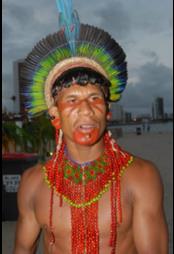
Pataxó leader, Brazil
Amnesty International has published its annual report on Brazil. In summary: ‘Racism continued to drive state violence. Mass killings by public security officials were frequent, disproportionately affecting Black people in marginalized neighbourhoods. Cis and transgender women, especially Black women, were targets of various forms of violence. In an election year, the dissemination of fake news and statements by President Bolsonaro incited politically motivated violence, threatened state institutions and undermined the functioning of judicial institutions. Many journalists and human rights defenders were threatened and killed. The social, political and economic situation continued to deteriorate, leading to violations of the rights to food, health, housing, work and social assistance, among others. Investigations into human rights violations documented by the Parliamentary Commission of Inquiry into the government’s handling of the Covid-19 pandemic were shelved. The historic failure of the state to confront structural racism continued to result in Indigenous peoples and Afro-descendants being disproportionately impacted by failings in institutional measures and actions.’
According to Greenpeace, London listed Canadian Serabi Gold stands accused of illegally mining gold in the Amazon without the permission of Brazil’s federal land agency, on disputed land, with licences contested by state agencies, and before a nearby Indigenous community has properly been consulted. The Company claims its mine is legal. This illustrates the tangled web of agencies and interests in Brazil’s Amazon.
The OAS’s International Commission of Human Rights has ordered the Brazilian state to take measures to protect the indigenous Pataxó people in Bahia state. Some of the Pataxó live in a contested area and since October 2022 they have been subject to ‘continuous violence’ including threats, harassment, shootings and defamation that culminated in the killing of three of their members with the connivance of the security forces. Members of the Military Police suspected of participating in these killings have been detained. But there is inadequate protection for this community.
CHILE
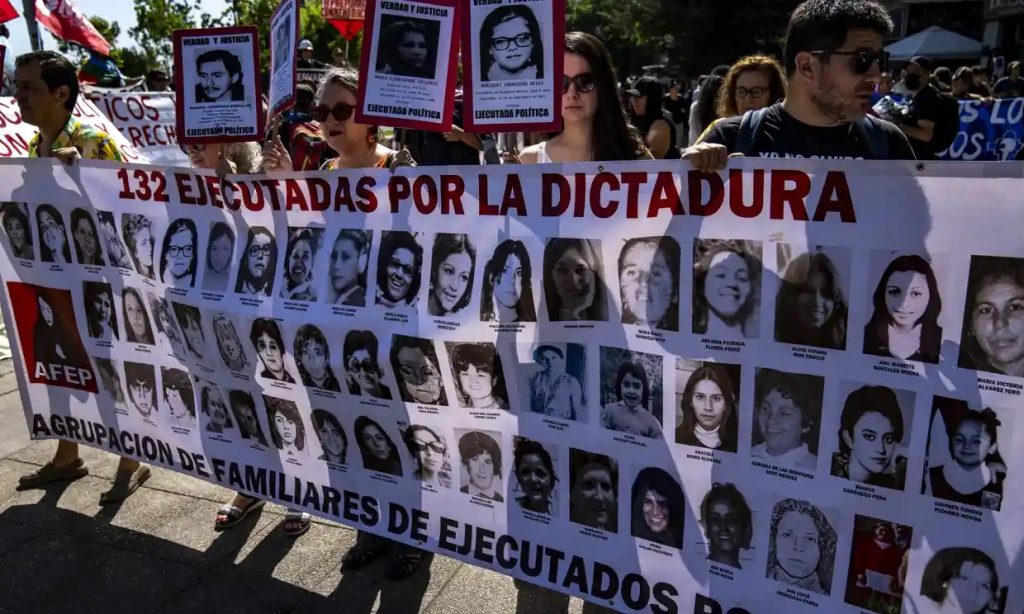
Protesters hold a banner with pictures of people killed during Pinochet’s dictatorship, in Santiago, Chile, in December 2022. Photograph: Esteban Félix/AP
This September will mark the 50th anniversary of Augusto Pinochet’s bloody coup which overthrew Chile’s democratically elected government. During the 17-year regime which followed, an estimated 40.000 people were tortured, and more than 3,000 killed. Only 310 of the forcibly disappeared have been identified and estimates for those still missing range from 1109 to 1469.
In March, Chile’s president, Gabriel Boric, announced the launch of a new plan to find the missing, part of his government’s electoral pledge to address human rights violations committed during the dictatorship. The National Search Plan is the first time in Chile’s democratic history that a government has backed a permanent search effort for the forcibly disappeared.
Three weeks ago, the Commission on Citizen Security of the Chilean Chamber of Deputies began to discussion a bill that criminalizes refugees and migrants in Chile who lack a regular migratory status. If approved, the law would impose prison sentences on those found guilty of irregular entry and stay in the country. Amnesty International issued an Urgent Action; this is also now on the AIUK website with the facility to send as an email.
As mentioned last month, Amnesty International published a new report in Chile:“No one wants to live in hiding”. Chile has failed to fulfil its obligations to protect people who have fled Venezuela. Amnesty International has identified a series of measures that effectively prevent people in need of protection from accessing regular migration status in Chile. Without options to regularize their migration status, Venezuelans in Chile are condemned to a situation of a total lack of protection.
We have been encouraged to write/email authorities in Chile and bring their attention to this report and Amnesty’s recommendations. David has created sample letters to the Minister of the Interior and Director of Migration Services (they are on his group’s website). With all actions please write or copy in the UK Ambassador Susana Herrera-Quezada, Chilean Embassy in London, 37-41 Old Queen Street, London SW1H 9JA
COLOMBIA
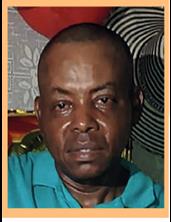
Libardo Castillo Ortiz, social leader
Barbacoa, Nariño, killed by gunmen 20 Jan 2022.
Amnesty International has issued an Urgent Action calling on President Petro to protect members of the human rights organisation CREDHOS. An explosive device was found at the entrance to their offices in Santander department on 10 April and the following day members were shot at by gunmen identified by the police as belonging to the National Liberation Army (ELN). For more than thirty years, CREDHOS has worked for the defence, promotion, and protection of human rights.
Amnesty International calls on President Petro and Defence Minister Ivan Velasquez to reform the National Police and protect the rights of protesters. This follows the excessive use of force by police against protesters calling for their rights during the National Strike two years ago. Some were shot and killed, others lost their sight, many were beaten and women were molested and raped by police. Please sign a message here.
Following the refusal of three of President Petro’s congressional coalition parties to agree his Public Health reforms, Petro has dismissed their ministers and is left with a minority in Congress. It is unclear how he will proceed with his proposed reforms without a majority. Congress has already approved his budget for 2023, which includes a 16% increase for the National Rural Development Plan launched by President Duque in 2021. As Colombian presidents are limited to one term of four years, Petro is understandably in a hurry.
The Colombian HR observatory, INDEPAZ, has published its report for the January-March quarter of 2023. 35 social leaders and human rights defenders were killed, 5 signatories to the Peace Accord were killed, 12 communities were forcibly displaced and 93 people were killed in 27 separate ‘massacres’. Although violence continues at a high level, this was less than the same period last year.
Amazon Watch reports that Colombia’s U’wa Indigenous people’s 25 year-long legal journey will culminate in a hearing before the Inter-American Court of Human Rights. ‘As the U’wa have defended their territory from oil companies, mining projects, and unwanted eco-tourism efforts on their sacred sites, they have complemented legal strategies with community mobilization, campaigning, and important protection of their territories through spiritual work.’
ECUADOR
Amnesty has issued an Urgent Action in respect of Pablo Fajardo Mendoza, lawyer of the Union of People Affected by Texaco (UDAPT). On April 26 in the Ecuadorian National Assembly, the Minister of Energy and Mines accused Pablo of being an “international criminal” for his defence of human rights, mainly of indigenous peoples and communities, against the impacts of oil company operations in the Ecuadorian Amazon. Stigmatising statements against human rights defenders can exacerbate hostility and intolerance by various sectors of the population, which can put their lives and integrity at risk. Please take action here or, if you prefer, you can wait for the action to appear on the AIUK website.
PERU
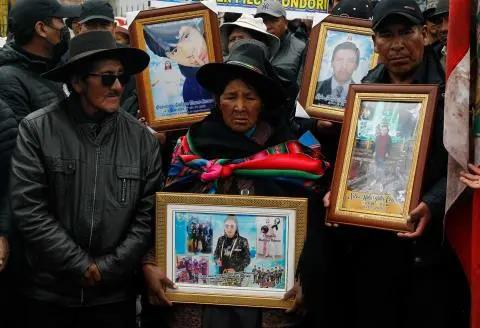
Human Rights Watch have published a report on the repression of the protests between December 2022 and February 2023. According to the report, “military and police likely carried out extrajudicial or arbitrary killings and committed other egregious abuses against demonstrators and bystanders” during the protest. It noted that abuses occurred against the backdrop of deteriorating democratic institutions, corruption, impunity for past abuses and persistent inequality. Amnesty will publish a full report on its own findings later this month.
PERU and CHILE – BORDER TENSIONS
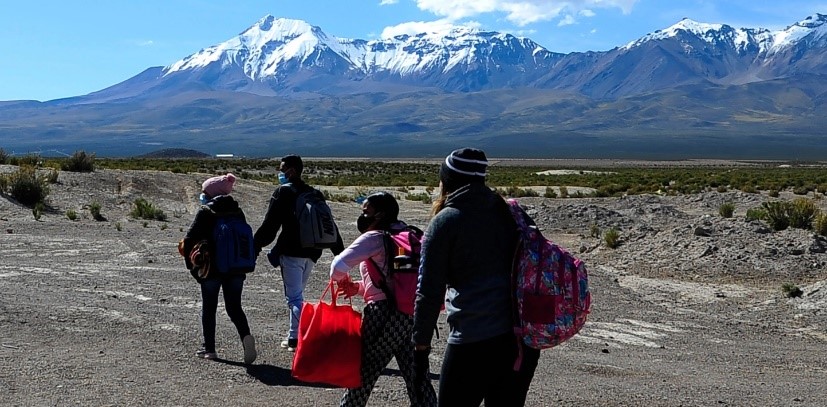
It is estimated that at least 300 people, including families with children and teenagers, pregnant women and the chronically sick, are stranded on the border between Peru and Chile in a critical humanitarian situation without food, water, shelter or health care in a desert known for its extreme conditions. Most of these people are from Venezuela but the presence of Haitians and other nationalities has also been reported.
Since the start of February, the Chilean government has deployed troops along its borders with Bolivia and Peru to prevent the arrival of undocumented people, mostly Venezuelans, into the country. The closure of the border has led to high tensions in recent weeks. On 26 April, the Peruvian government declared a state of emergency in seven border departments and ordered the deployment of its armed forces. These measures have been adopted against a backdrop of increasing stigmatisation and xenophobia, and legislative debates that seek to criminalise irregular migration.
Amnesty has reminded both governments that this is a crisis of people in need of international protection who require a comprehensive plan of assistance that places human rights at the heart of both governments’ responses.
VENEZUELA
Amnesty International has published a new Urgent Action campaigning for the immediate provision of medical care for Emirlendris Bentitez. Emirlendris is a 42 year-old mother, sister, and tradeswoman, who was arbitrarily detained in August 2018 for political reasons and subjected to torture in Venezuela. She now faces an unjust 30-year prison sentence in inhumane detention conditions and urgently needs medical care. If you have not yet taken action, and want to join those who already have, then please do tweet the following message to the Venezuelan Minister for Penitentiary Affairs, Celsa Bautista Ontiveros, cc’ing in UN Human Rights High Commissioner @volker_turk : “Minister @CelsaBautistaO, the prison conditions Emirlendris Benítez has to endure are inhumane. Emirlendris shouldn’t be imprisoned, but as long as she is, it is your duty to ensure she receives immediate medical care. #LiberenAEmirlendris. @volker_turk”.
The lates Urgent Action joins those also underway for Javier Tarazona and the proposed law controlling non-governmental organizations, Javier, director of Venezuelan NGO FundaRES, was arbitrarily detained on 2nd July 2021, without any court order and without his detention being communicated to his lawyers. He has now been charged with inciting hatred, treason, and terrorism. No evidence has been presented to support the allegations. Javier’s health is deteriorating; he has no access to medical treatment. The proposed NGO bill, the subject of the other ongoing Urgent Action, will require Venezuelan non-governmental organizations to disclose their members and funding and may be used as another weapon to control non-governmental organizations and human rights defenders in the country.
You can take action for Javier by sending a tweet to Venezuelan Attorney General Tarek William Saab, saying ‘@TarekWiliamSaab immediately release the prisoner of conscience and human rights defender @javiertarazona from @FundaREDES. His health is at risk. He must receive medical treatment urgently. Stop the criminalization of NGOs in #Venezuela. #LiberenAJavierTarazona’. For the NGO-bill Urgent Action, you can tweet @jorgepsuv (with @volker_turk) saying “.@jorgepsuv, as President of the Venezuelan National Assembly currently discussing the unacceptable law against NGOs in #Venezuela, we demand you put an immediate end to this bill and stop attacking Venezuelan civil society. CC: @volker_turk”. Other forms of actions are found on the webpages for the Urgent Actions (The Urgent Action for Javier found here and the Urgent Action calling for the halting of the NGO-bill found here).
More widely, Colombia has been holding talks this week between representatives from Argentina, Brazil, Spain, the UK, and the US, amongst others, exploring how talks between the Venezuelan authorities and the opposition can be restarted. Neither the Venezuelan authorities nor the opposition were present. Previous dialogue between the opposing parties occurred in December 2022. President Maduro is currently asking for the release of the Venezuelan diplomat and business Alex Saab, who has been jailed in the US on money laundering charges, as well as for the creation of a multi-billion dollar humanitarian fund agreed during the last round of political discussions. Human Rights NGOs, including Amnesty International, have written an open letter to Gustavo Petro, the Colombian President, asking that human rights issues are put on the agenda for international meetings.
Previous representative for the opposition, Juan Guaido, had entered Colombia in an attempt to attend the discussions, however, he was escorted out of the country after the Colombian foreign ministry deemed that he had entered the country improperly. Guiado his position as leader of the opposition parties in December 2022, where members of the opposition voted to dissolve his government.
Ahead of the elections this year, the opposition is attempting to unite behind a common candidate, with contenders Henrique Capriles and Giuado deciding to compete in the primaries despite being disqualified from participating in elections. The European Union has suggested 23 reforms after observing the 2021 Venezuelan regional elections, including greater independence for the highest court in Venezuela and balance in state-owned coverage of electoral campaigns.
Venezuelan women have continued to be killed at the hands of men through the first three months of 2023. The NGO Utopix have registered 47 femicides during the reporting period, meaning that, in Venezuala, a woman is murdered every 45 hours. Campaigners have called for the Maduro government to do more to tackle crime against women, stating that too little has been done to ensure that perpetrators to be brought to justice.